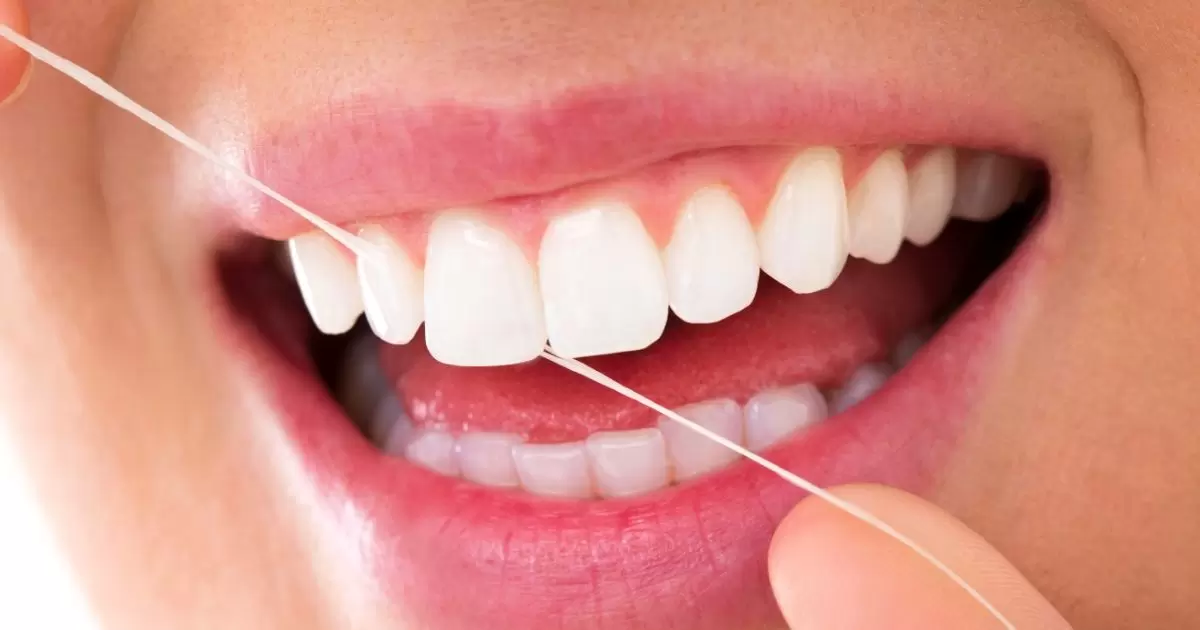Getting implants after dentures refers to the process of securing dental implants in the jawbone to support artificial teeth, typically after using removable dentures. This procedure enhances stability, functionality, and aesthetics, allowing individuals to regain a more natural and comfortable oral experience.
Wondering about a brighter, more secure smile? Explore the possibility of transformation – can you get implants after dentures? Unleash the potential for enhanced comfort and confidence. Take the first step toward a natural and lasting solution for your oral well-being.
Yes, it is possible to get dental implants after having dentures. Dental implants provide a more secure and permanent solution for tooth replacement, offering improved stability and functionality compared to traditional dentures. Consult with your dentist to explore if implants are a suitable option for you.
What Are Dental Implants?
Dental implants are artificial tooth roots surgically placed into the jawbone to support replacement teeth. They provide a stable foundation for crowns or dentures, offering a natural look and feel. Dental implants are a durable and long-term solution for restoring missing teeth and improving overall oral health.
Traditional Dental Implants
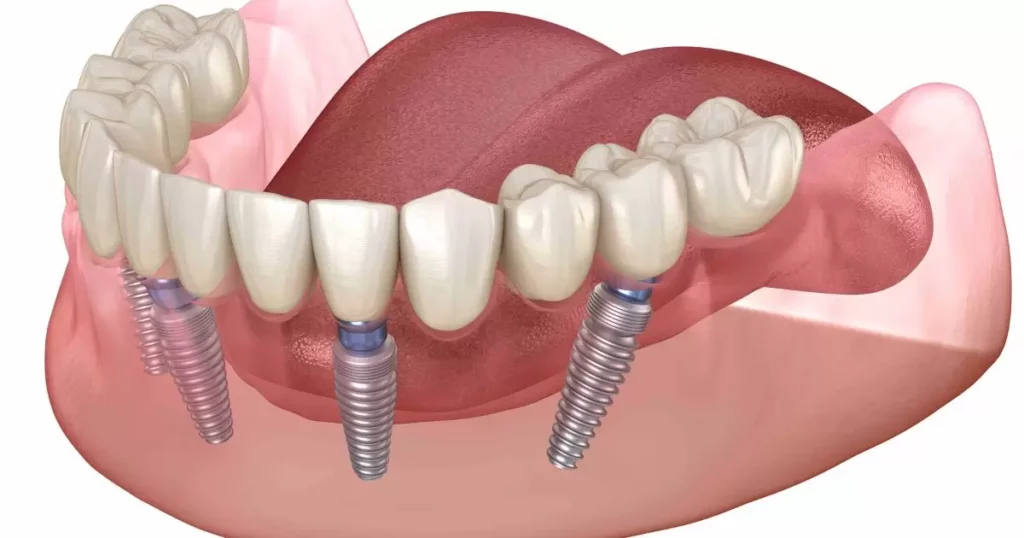
Traditional dental implants provide a durable and permanent solution for missing teeth by securely anchoring artificial teeth to the jawbone. Unlike dentures, which are removable, traditional dental implants offer a more natural feel and function, enhancing both comfort and confidence in daily activities.
All On 4 Dental Implants
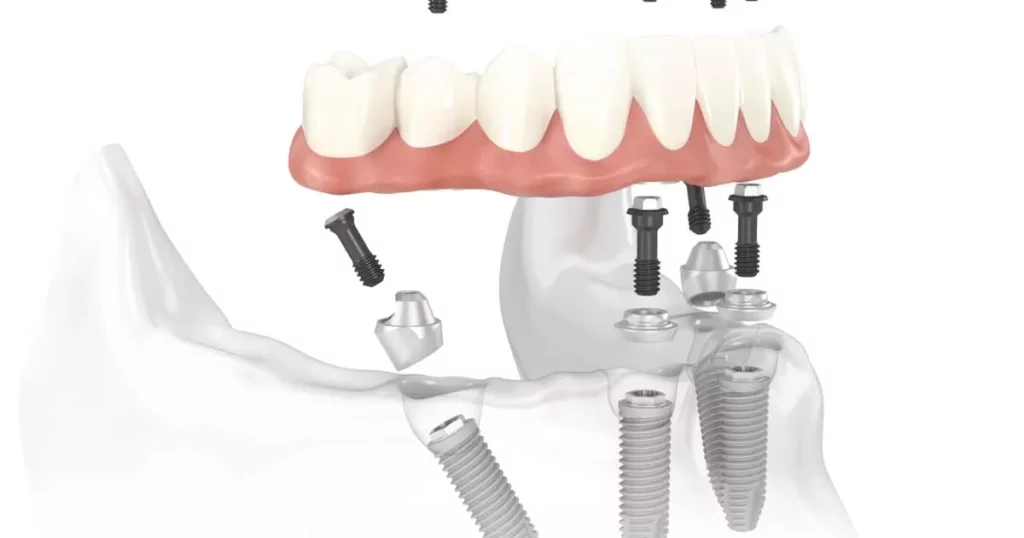
All-on-4 dental implants offer a revolutionary solution for those seeking stable and natural-looking dentures. This innovative technique involves placing just four implants to support a full set of teeth, providing a more comfortable and permanent alternative to traditional dentures.
What Are The Benefits Of Dental Implants?
- Natural Feel and Appearance: Dental implants closely resemble natural teeth, providing a comfortable and aesthetically pleasing solution.
- Improved Oral Function: With dental implants, you can enjoy enhanced chewing ability and speech, restoring functionality to a level similar to that of natural teeth.
- Long-Term Durability: Unlike some alternatives, dental implants are a durable and long-lasting option, offering a reliable solution for missing teeth.
- Preservation of Jawbone: Dental implants help prevent bone loss in the jaw, maintaining overall oral health and preventing changes in facial structure.
- Convenience and Confidence: Dental implants eliminate the inconvenience of removable dentures, providing a permanent and secure solution that restores confidence in your smile and daily activities.
Dental Implant Improvements
Dental implant improvements have revolutionized the field of dentistry, providing patients with more reliable and natural-looking alternatives to traditional dentures. These advancements include enhanced materials and techniques, resulting in increased durability and improved aesthetics for those seeking a permanent solution to tooth loss.
Unlike traditional dentures, dental implants offer a secure and long-lasting option by integrating artificial teeth directly into the jawbone. This not only improves overall stability but also enhances the ability to eat and speak comfortably, providing individuals with a more confident and functional smile.
Why Switch From Dentures to Implants?
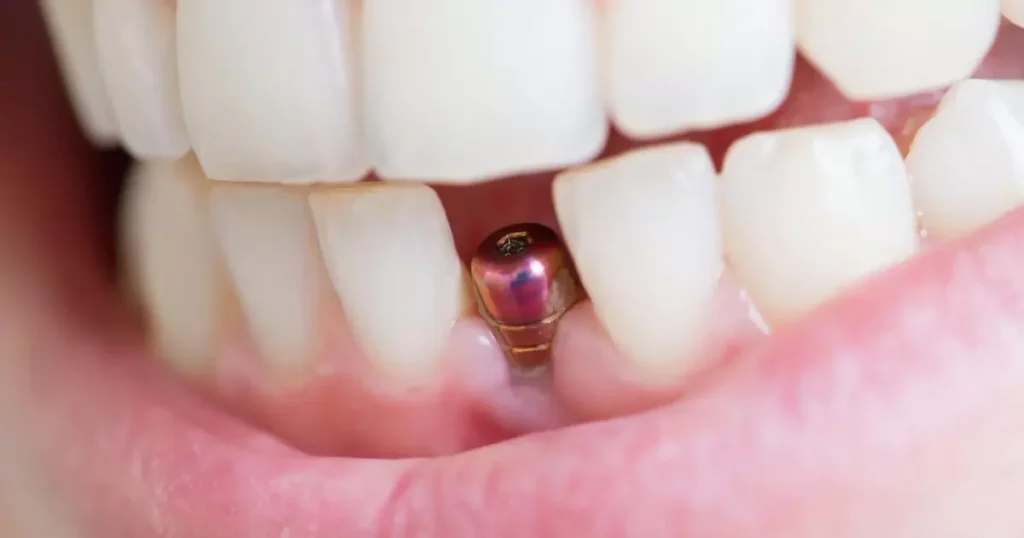
Switching from dentures to implants offers numerous benefits. Dental implants provide a more natural and comfortable feel, allowing individuals to eat, speak, and smile with confidence. Unlike dentures, implants are a permanent solution, promoting better oral health and eliminating the hassle of removable prosthetics.
Dental implants enhance facial aesthetics by preventing bone loss, maintaining the structure of the jaw. The transition from dentures to implants not only improves functionality but also boosts overall well-being, providing a long-lasting and stable solution for those seeking a more permanent and effective dental option.
How Do Dental Implants Improve Your Oral Health?
Dental implants significantly enhance oral health by providing a stable foundation for replacement teeth. Unlike traditional dentures, implants integrate into the jawbone, preventing bone loss and maintaining facial structure. This not only improves aesthetics but also ensures better chewing function, speech, and overall oral comfort.
Dental implants promote oral hygiene by eliminating gaps where bacteria can accumulate. With proper care, implants can last a lifetime, offering a durable and natural-looking solution that boosts confidence and supports long-term oral health.
Can you get dental implants if you have no teeth
If you have no teeth, getting dental implants is still possible. Dental implants can be successfully placed in the absence of natural teeth, providing a stable foundation for replacement teeth.
Even if you are completely toothless, modern dental techniques allow for the placement of implants to support dentures or bridges. This procedure enhances chewing ability, restores facial aesthetics, and improves overall oral health.
Consultation with a qualified dentist is crucial to determine the feasibility of dental implants based on individual oral health conditions. Advances in implant technology have made it a viable option for those without teeth, offering a more natural and functional solution.
how much do snap-in denture implants cost
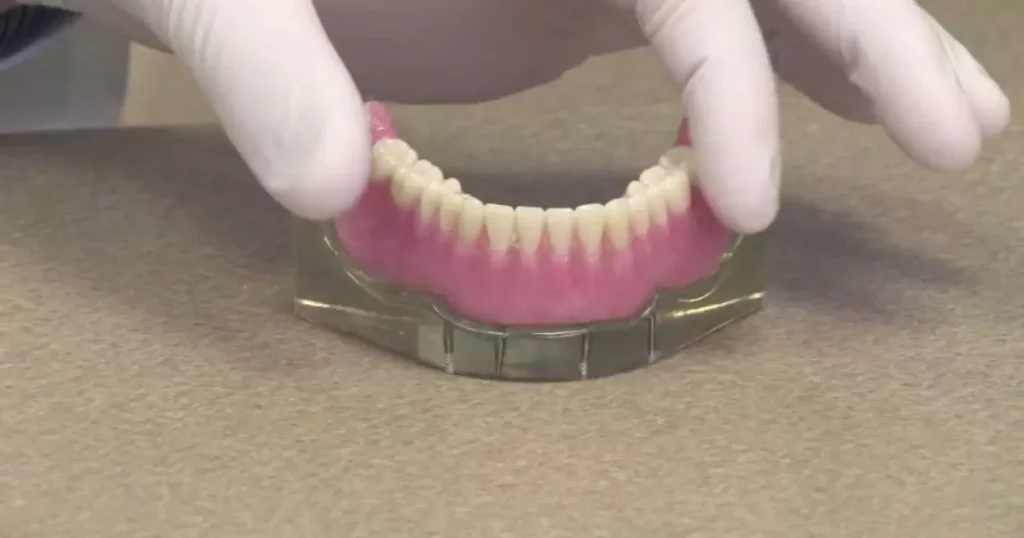
Snap-in denture implants cost can vary depending on factors like location, dentist expertise, and the type of implants chosen. On average, the cost may range from $1,500 to $6,000 per implant.
Factors influencing the cost of snap-in denture implants include the materials used, the need for preliminary procedures like bone grafts, and the choice between removable or fixed implants. It’s essential to consult with a dentist for a personalized estimate based on individual needs and circumstances.
Keep in mind that the overall cost of snap-in denture implants includes not only the surgery and materials but also follow-up appointments, adjustments, and potential additional procedures. It’s advisable to discuss all aspects of the treatment plan with your dentist to get a comprehensive understanding of the total cost involved.
Can dental implants be removed and replaced with dentures
Dental implants are typically designed to be a permanent solution for missing teeth. However, in certain situations, they can be removed and replaced with dentures. This process may be necessary if the implants fail to integrate with the jawbone or if there are complications that require a change in treatment.
The removal of dental implants is a surgical procedure that involves carefully detaching them from the surrounding bone. Once removed, dentures can be fitted in place to restore the appearance and function of the patient’s smile. It’s essential to consult with a dental professional to determine the best course of action based on individual circumstances.
While dental implants offer a durable and long-lasting solution, circumstances such as infection, implant failure, or changes in health may necessitate their removal. The decision to replace them with dentures depends on various factors, and a thorough assessment by a dentist will guide the most appropriate treatment plan for each patient.
Dental implants for denture wearers
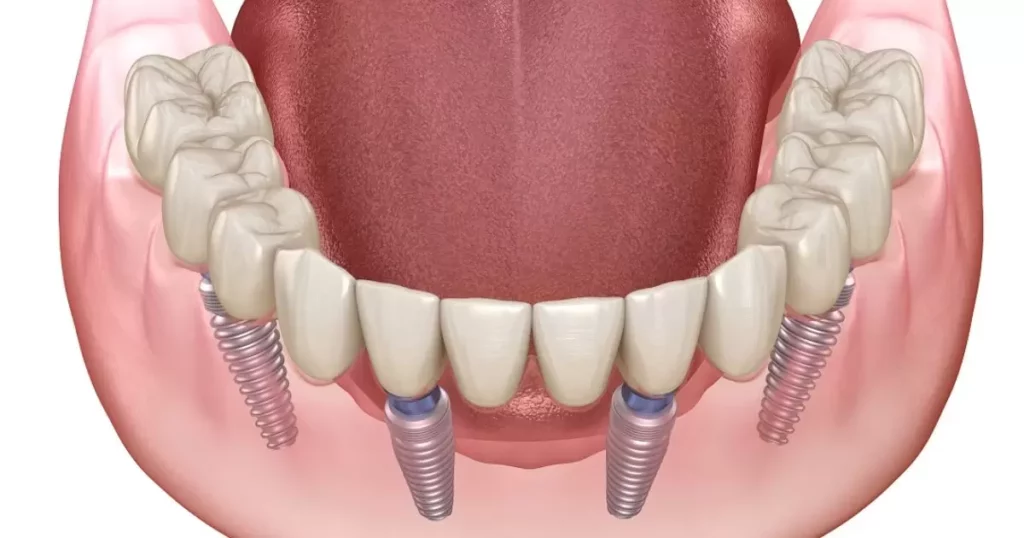
Dental implants for denture wearers offer a revolutionary solution to enhance stability and comfort. By securely anchoring dentures to the jawbone, these implants provide a more natural feel, allowing individuals to confidently enjoy their favorite foods and smile with assurance.
This innovative approach not only improves the overall quality of life for denture wearers but also promotes better oral health, as dental implants help prevent bone loss and maintain the integrity of the jaw structure.
When is it too late to get dental implants
It’s never too late to consider dental implants, as age is not the sole determining factor. The key consideration is the overall health of the individual. Dental implants can be successfully placed in older adults, provided they have good bone density and general health.
Delaying treatment may lead to a decrease in bone quality, making the process more complex. Consulting with a dentist is crucial to assess individual suitability and discuss the best options for achieving a healthy and functional smile.
The optimal time for dental implants is when the patient is medically stable and has adequate bone support. While there’s no strict age limit, addressing tooth loss promptly enhances the chances of a successful implant procedure. Regardless of age, individuals should seek professional advice to determine the most suitable timing for their unique circumstances.
Can you get implants after partial dentures?
| Question | Answer |
| Can you get implants after partial dentures? | Yes, it is often possible to get dental implants after wearing partial dentures. |
| Is there a specific timeframe for this? | There is no strict timeframe, but timely consideration may prevent bone loss, making the process smoother. |
| What factors influence eligibility? | Factors such as overall health, bone density, and gum condition play a role in determining eligibility. |
| How does the process typically work? | The process involves a consultation with a dentist or oral surgeon, who will assess suitability and discuss treatment options. |
| Are there any age restrictions? | Age alone is not a restriction; the key is good overall health and adequate bone support. |
| What if bone loss has occurred? | Bone grafting may be considered to enhance bone support for the implants, even after partial denture use. |
| How long does the entire process take? | The timeframe varies but generally involves multiple appointments for assessment, surgery, and healing. |
| What are the benefits of implants? | Dental implants offer improved stability, function, and aesthetics compared to traditional partial dentures. |
Are dentures better than implants?
Dentures and implants serve different purposes in restoring missing teeth. Dentures are removable prosthetic devices that are cost-effective and suitable for those with multiple missing teeth. They offer a quick solution but may require regular adjustments.
On the other hand, dental implants are a permanent and more natural-looking option. They provide better stability and functionality, resembling natural teeth. While implants are a more significant investment, many people find them to be a superior long-term solution for oral health and aesthetics.
Frequently Asked Question
Can you eat with dentures?
Yes, you can eat with dentures, but it’s advisable to start with soft foods and gradually transition to a regular diet as you become accustomed to wearing them.
Who is not suitable for dentures?
Individuals with poor oral health, inadequate jawbone structure, or those seeking a more permanent solution may not be suitable candidates for dentures.
Are dental implants more expensive than dentures?
Yes, dental implants are generally more expensive than dentures upfront. However, they are considered a long-term investment as they offer greater durability and a more natural feel compared to removable dentures.
Conclusion
The possibility of getting implants after dentures offers individuals a pathway to a more permanent and natural-looking solution for missing teeth. While dentures serve as a practical option, dental implants provide enhanced stability, functionality, and a long-term investment in oral health.
The decision to transition from dentures to implants depends on individual preferences, oral health considerations, and the desire for a fixed, durable solution that closely mimics natural teeth. Consulting with a dentist can help determine the most suitable course of action based on individual needs and circumstances.

